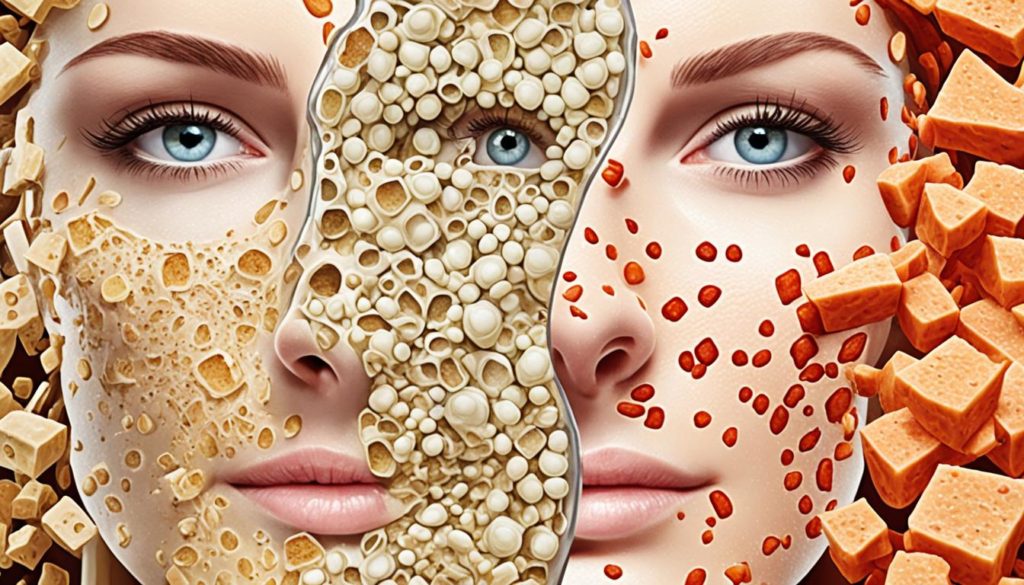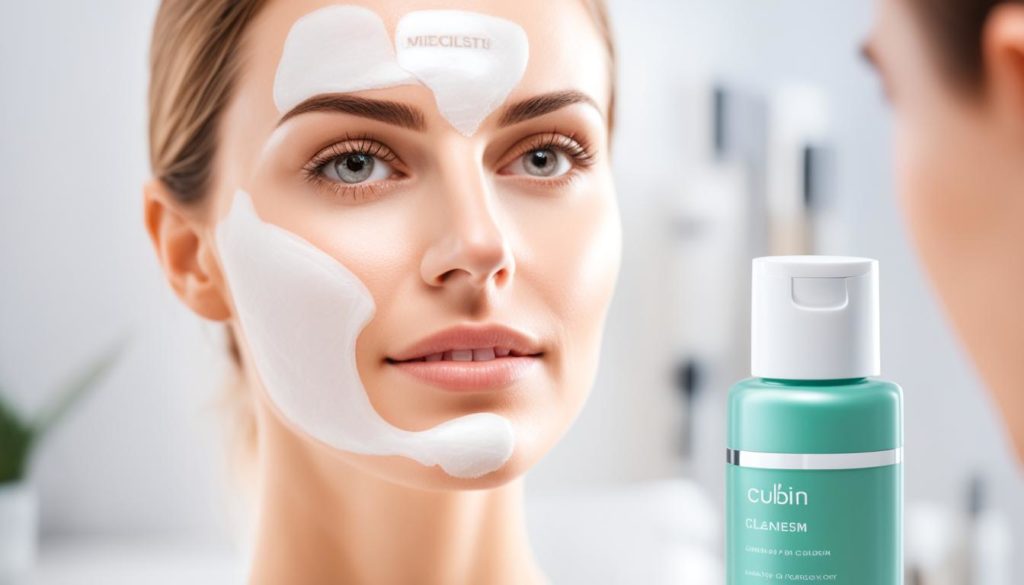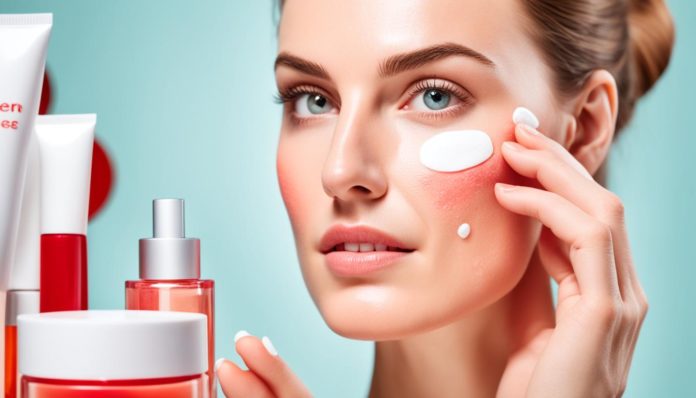Did you know that around 85% of people between the ages of 12 and 24 experience some form of acne? This fact highlights the need to understand acne better and find effective solutions. Given this high percentage, having a skincare regimen to manage and lessen outbreaks is key.
This guide aims to provide real help and acne solutions for those looking to better their skin. It outlines how to identify acne causes and follow a daily skincare routine. You’ll find successful treatment methods, tips for clearer skin, and acne-fighting solutions here.
Key Takeaways
- Around 85% of individuals aged 12 to 24 experience acne.
- Effective skincare routines are essential for managing acne and preventing outbreaks.
- The guide focuses on actionable acne treatment strategies and clear skin tips.
- Understanding the causes of acne can help tailor skincare practices.
- Adopting acne-specific solutions can significantly improve skin health.
Understanding Acne and Its Causes
Acne is a skin condition that affects millions around the globe. It comes in different shapes, causing stress for many. Knowing what causes acne and its types is key to control it.
What is Acne?
Acne is more than just pimples and blackheads, appearing mainly on the face, neck, back, and shoulders. Clogged pores, bacteria, and too much oil are the main culprits. By understanding these aspects, we can better grasp how acne forms.

Main Causes of Acne
Knowing what leads to acne is the first step to effective treatments. Here are the primary causes:
- Hormonal Changes: Puberty, menstruation, and pregnancy can all cause breakouts.
- Genetics: If your family has acne, you might too.
- Lifestyle: Stress, what you eat, and your skincare can affect acne.
Types of Acne
For better treatment, know the types of acne. Here are the main ones:
| Type | Characteristics |
|---|---|
| Blackheads | Open spots that turn dark when the surface oxidizes. |
| Whiteheads | They stay under the skin, looking like small, white bumps. |
| Cystic Acne | This severe type causes large, painful cysts under the skin. |
Daily Skincare Routine for Acne-Prone Skin
Having acne-prone skin means following a daily skincare routine with gentle products. Start with a morning routine to get ready for the day. Then have an evening routine to cleanse and heal your skin. Don’t forget to add weekly treatments to control acne and keep your skin clear.

Morning Routine
Begin your morning with a gentle, non-comedogenic cleanser. This removes overnight oils and impurities, helping to keep pores clear.
- Cleanser: Use a mild, sulfate-free cleanser.
- Toner: Opt for a toner with salicylic acid to help keep pores clean.
- Moisturizer: Always use an oil-free, non-comedogenic moisturizer to keep your skin hydrated.
- Sunscreen: Apply a broad-spectrum sunscreen with SPF 30 or higher to protect your skin from harmful UV rays.
Evening Routine
The evening routine is crucial for removing the day’s buildup and helping your skin repair. It is key to managing acne and avoiding new breakouts.
- Makeup Remover: If you wear makeup, start with an oil-free makeup remover.
- Cleanser: Use the same gentle cleanser used in the morning to wash away dirt and oil.
- Toner: Apply the same toner to maintain pore cleanliness.
- Treatment: Use a prescription or over-the-counter acne treatment like benzoyl peroxide or retinoid.
- Moisturizer: Finally, apply a light, oil-free moisturizer to hydrate without clogging pores.
Weekly Treatments
Weekly treatments boost your management of acne. Use exfoliation and deep-cleansing masks to prevent problems before they grow.
- Exfoliation: Use a gentle exfoliant once or twice a week to remove dead skin cells. This prevents pore blockages. Choose products with salicylic acid.
- Face Masks: Apply a clay or charcoal mask weekly for deep pore cleansing and oil absorption.
- Peels: Use chemical peels, such as glycolic or lactic acid, once a week. They promote new cell growth and reduce acne marks.
| Step | Product Type | Frequency |
|---|---|---|
| Cleanser | Mild, sulfate-free | Daily (Morning and Evening) |
| Toner | Salicylic acid-based | Daily (Morning and Evening) |
| Moisturizer | Oil-free, non-comedogenic | Daily (Morning and Evening) |
| Sunscreen | Broad-spectrum SPF 30+ | Daily (Morning) |
| Exfoliator | Gentle, salicylic acid | 1-2 times a week |
| Face Mask | Clay or charcoal | Weekly |
Dermatologist Recommended Acne Products
Getting help from a professional is key for effective acne management. Dermatologists suggest many powerful treatments that work well against acne. These recommended treatments make the skin clearer and help prevent breakouts.
Here are some top acne skincare products that dermatologists prescribe:
- Retinoids: These are based on vitamin A and help open pores and renew skin cells. Products like Differin (adapalene) are known to be very effective in treating acne.
- Salicylic Acid: This ingredient is great for peeling the skin and cleansing pores. Many acne skincare products, including Neutrogena Oil-Free Acne Wash, use it.
- Benzoyl Peroxide: It fights the bacteria that cause acne. Dermatologists often recommend using products like PanOxyl Acne Foaming Wash because they contain this ingredient.
These dermatologist-recommended treatments can really help reduce acne problems, lessen scarring, and make skin smoother. Adding these specific acne care products to your daily skincare routine can boost your skin’s health.
Over-the-Counter Acne Treatments
Managing acne starts with over-the-counter (OTC) products. These are easy to find and combat different acne types. We’ll look at the best OTC acne creams and gels and how to use them safely for the best results.
Top OTC Acne Creams and Gels
To fight acne, it’s crucial to pick effective OTC solutions. Here are some top acne creams and gels:
| Product | Key Ingredient | Benefits |
|---|---|---|
| Neutrogena On-The-Spot Acne Treatment | Benzoyl Peroxide | Reduces inflammation and kills acne-causing bacteria. |
| Clean & Clear Persa-Gel 10 | Benzoyl Peroxide | Effective spot treatment for mild to moderate acne. |
| La Roche-Posay Effaclar Duo | Benzoyl Peroxide and LHA | Unclogs pores and smoothens skin texture. |
| Paula’s Choice Clear Regular Strength | Salicylic Acid | Exfoliates dead skin cells and reduces blackheads. |
How to Use OTC Products Safely
Using safe acne treatment methods is key to avoiding skin issues. Here are tips for safely utilizing OTC acne products:
- Patch Test: Do a patch test with new acne creams to check for allergies.
- Follow Instructions: Always follow the product label directions to avoid overuse and irritation.
- Avoid Mixing Products: Mixing different acne treatments can cause dryness and sensitivity.
- Moisturize: Keep your skin hydrated with a non-comedogenic moisturizer during treatment.
- Sun Protection: Use sunscreen daily as some treatments can increase UV sensitivity.
Natural Remedies for Acne
Exploring natural remedies for acne is a safe way to handle it. Many people use herbal solutions and DIY skincare. Let’s talk about the top natural treatments for clear skin.
Herbal Treatments
Herbs can heal your skin naturally. Tea tree oil, witch hazel, and aloe vera fight inflammation and bacteria. They are great for your skin’s health.
- Tea Tree Oil: This oil helps reduce redness and swelling.
- Witch Hazel: It’s a natural astringent that controls oil and tightens skin.
- Aloe Vera: Soothes irritated skin and helps it heal faster.
DIY Face Masks
Making your own skincare masks is fun and beneficial. Here are some easy recipes suited to your skin’s needs:
- Honey and Cinnamon Mask: A mix of honey and cinnamon fights bacteria and lessens inflammation.
- Oatmeal and Yogurt Mask: Oatmeal and yogurt mix exfoliates and calms your skin.
- Turmeric and Milk Mask: Turmeric, mixed with milk, fades acne scars and brightens your skin.
Benefits of Natural Solutions
Using natural acne remedies has several advantages:
- Gentle on Skin: They are kinder than chemical treatments and good for sensitive skin.
- Fewer Side Effects: You’re less likely to have bad reactions using herbal and DIY skincare.
- Eco-Friendly: Natural ingredients mean you’re helping your skin and the planet.
| Natural Ingredient | Main Benefit | Application Method |
|---|---|---|
| Tea Tree Oil | Antibacterial & anti-inflammatory | Apply diluted oil to affected areas with a cotton swab |
| Witch Hazel | Astringent & oil control | Use as a toner after cleansing |
| Aloe Vera | Soothing & healing | Apply fresh gel directly to the skin |
| Honey | Antibacterial & moisturizing | Use as a mask or spot treatment |
| Turmeric | Anti-inflammatory | Mix with milk and apply as a mask |
Skin Care for Acne Prevention
To fight acne, it’s key to use a holistic skincare approach. This involves not just creams and cleaners, but also changing your lifestyle and what you eat. By using these acne prevention strategies, your skin can become clear and healthy.
Lifestyle Changes
Making some changes in your life can greatly help with acne. Here are a few important acne prevention strategies:
- Maintain Hygiene: Wash your face often to remove dirt and oil.
- Manage Stress: Trying yoga or meditation can lower your stress and help prevent acne.
- Exercise Regularly: Active living boosts blood flow and supports skin health.
- Avoid Touching Your Face: Keep your hands off your face to avoid spreading germs.
Dietary Recommendations
What you eat is very important for keeping your skin clear. Some foods can make acne worse, and others can help fight it. Here are tips for a diet for clear skin:
- Reduce Dairy Intake: Cutting down on dairy might help with acne, studies show.
- Avoid High-Glycemic Foods: Foods like white bread and sugary snacks can increase acne by raising insulin levels.
- Increase Omega-3 Fatty Acids: Eating foods high in Omega-3s, such as salmon and walnuts, can lower inflammation and improve your skin.
- Stay Hydrated: Drinking lots of water helps remove toxins and keeps your skin moist.
Best Products for Acne Care
To care for acne-prone skin, you need the right products. We will look at the top acne products, focusing on effective acne cleansers and moisturizers for acne-prone skin.
Top Cleansers
Choosing a good cleanser is key for clear skin. We highlight the most effective acne cleansers below:
| Product | Brand | Key Benefits |
|---|---|---|
| Cetaphil Daily Facial Cleanser | Cetaphil | Gentle on skin, removes excess oil |
| La Roche-Posay Effaclar Medicated Gel Cleanser | La Roche-Posay | Targets pimples, unclogs pores |
| Neutrogena Oil-Free Acne Wash | Neutrogena | Contains salicylic acid, helps prevent breakouts |
Moisturizers Suitable for Acne-Prone Skin
Hydration is vital for balanced skin. Even those with acne need to moisturize properly. Here are the best moisturizers that won’t make acne worse:
| Product | Brand | Key Benefits |
|---|---|---|
| Cetaphil Oil Absorbing Moisturizer with SPF 30 | Cetaphil | Controls shine, protects from UV rays |
| Neutrogena Hydro Boost Water Gel | Neutrogena | Non-comedogenic, lightweight hydration |
| CeraVe AM Facial Moisturizing Lotion | CeraVe | Includes ceramides, niacinamide for skin barrier support |
How to Get Rid of Acne: Proven Techniques
To get rid of acne, seeing a skin doctor can help a lot. Laser therapy is one way to go. It targets the skin deep down, fighting inflammation and germs. This is especially good for tough acne, helping skin become clear.
Chemical peels are another great option. They use strong acids to peel away skin, getting rid of dead cells and open pores. It’s a top method for clear skin that makes your skin smooth and even.
If you like creams, try medicated ones like retinoids and antibiotics. These fight acne right where it starts, making your skin healthy over time. Retinoids come from vitamin A. They’re good at making new skin cells fast and cutting down on pimples.
Knowing how these acne elimination techniques work is key to clear skin. You can choose from the best laser treatments, chemical peels, or creams. Each has its own benefits for making your skin clear and free of spots.
Conclusion
We’ve looked deeply into what causes acne and how to treat it. It’s clear that acne impacts everyone differently. This means a skincare routine that suits you is key. We’ve covered everything from daily habits to the best products recommended by dermatologists.
We also discussed how natural remedies and changes in your lifestyle can keep your skin clear. Eating right and making certain lifestyle adjustments can really cut down on breakouts. It’s crucial to see these precautions as part of your long-term skincare strategy.
Last, we talked about the importance of getting advice from a dermatologist. A customized plan from a skin doctor can really make a difference. For a closer look at how acne can affect your life, check out this study on acne and its impacts. Clear skin is a balance of the right information, effective treatments, and ongoing care.
FAQ
What is the best skincare routine for acne-prone skin?
A good skincare routine includes several steps. Start with a gentle cleanser and a non-comedogenic moisturizer in the morning. Also, don’t forget sunscreen.
In the evening, add a treatment product. This could be benzoyl peroxide or salicylic acid. Once or twice a week, exfoliate to keep pores clear.
Why do I get acne even as an adult?
Adult acne can be frustrating. It’s often caused by hormonal changes, stress, genes, and lifestyle. Seeing a dermatologist can identify the specific cause and treatment.
What ingredients should I look for in acne treatment products?
Effective acne fighters include salicylic acid and benzoyl peroxide. Also, look for retinoids and AHAs. They help by unclogging pores, reducing inflammation, and renewing skin cells.
Are OTC acne treatments effective?
Yes, OTC treatments can work for mild to moderate acne. Effective options often have salicylic acid, benzoyl peroxide, or AHAs. Remember to follow the instructions to prevent irritation.
Can natural remedies really clear up acne?
Natural remedies like tea tree oil and aloe vera can soothe acne-prone skin. They can be helpful, especially when used with recommended treatments from a dermatologist.
How can I prevent acne from developing?
To prevent acne, maintain a good skincare routine and make healthy lifestyle changes. Reduce stress and cut down on high-glycemic foods and dairy. Keeping your skin clean and avoiding products that clog pores is key.
What products are best for moisturizing acne-prone skin?
Select non-comedogenic moisturizers to avoid clogging pores. Look for products with hyaluronic acid, glycerin, and niacinamide. They hydrate without worsening acne.
How do dermatologist-recommended products differ from OTC treatments?
Dermatologist-recommended products often have more active ingredients. They are tested for effectiveness and safety. Products like prescription retinoids can offer stronger results than what you’d find OTC.
What advanced treatments are available to get rid of acne?
For tough acne, consider advanced treatments. These include laser therapy, chemical peels, and medicated topicals. Performed by professionals, they target skin’s deeper layers for notable improvements.
How important is diet in managing acne?
Diet impacts your skin’s health. Cutting back on high-glycemic foods and dairy may help improve acne. Foods rich in antioxidants, omega-3s, and fiber can also promote clearer skin.


